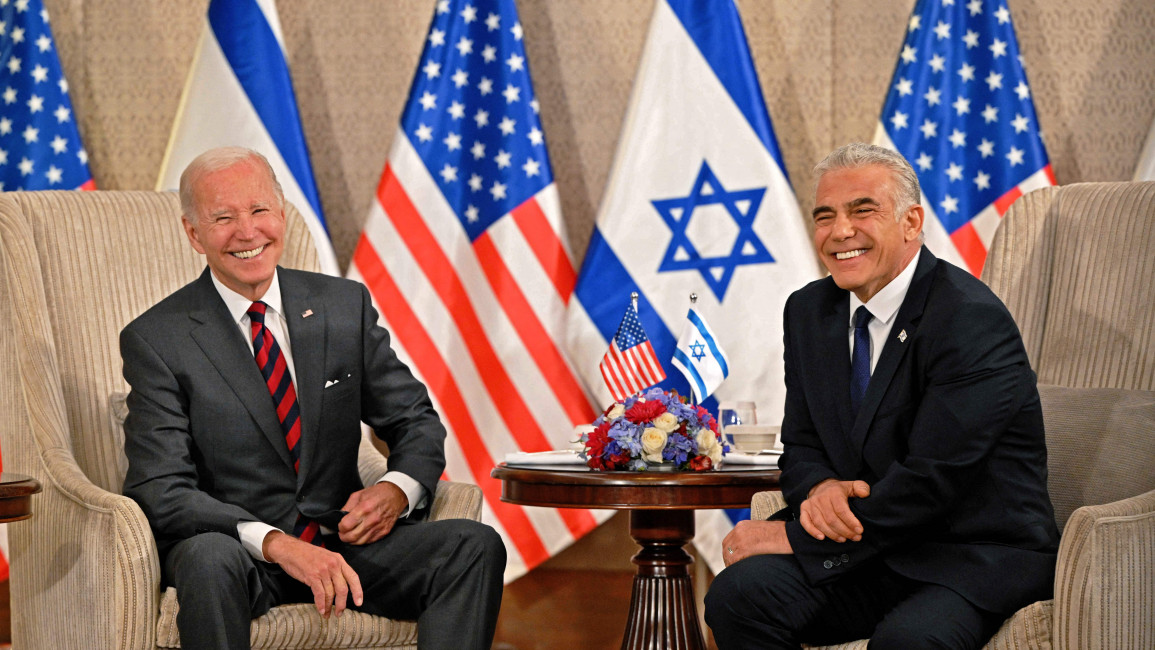
In Palestine, Biden is a false prophet and the two-state solution is a delusion
The last time he landed in the Middle East, he was President Obama’s advisor. But last week Joe Biden returned as President of the United States to a region that has since seen notable geopolitical shifts and new alliances.
At Israel’s Ben-Gurion Airport, his first stop, stumbling and mumbling before finally finding the podium, Biden soon reassured Israelis - once again - that the only constant in the changing Middle East is the US’ unconditional support for Israel.
To make the point, Biden felt it was necessary to fumble into his bag of cliches to remind everyone that, indeed, one needs not be a Jew to be a Zionist. To that, as if it was a God-sent revelation, the new Israeli prime minister Yair Lapid replied that Biden “is one of Israel’s best friends.”
The ceremonial flirtation saw several Israeli officials, many identified as prime ministers only within the last four years, fighting their way to the stage to make their presence known to Biden.
"Behind its suave appearance and the vibe of sophistication, politics, much like life, can be an exercise of absurdity, even if placed on a red carpet"
But against former PM Netanyahu, everyone seemed like an amateur in the act of fawning. Well practised in breaking onto the front rows of everything, much like he snuck into the first row of France’s Charlie Hebdo rally despite not being invited, Netanyahu jostled himself ahead of Lapid and, almost literally, threw himself at Biden.
For a hopeful moment there, one thought that was the peak of the red carpet absurdity. But that was premature.
Israel’s Defence Minister Benny Gantz, the man whose main hobbies include threatening other countries and sneaking into Ramallah to meet with Abbas, ended the show with a blast as he showed off his strong teeth trying to open a water bottle with them.
It is probably “the cringe element” in the ceremony that reflects the seriousness of the situation. Behind its suave appearance and the vibe of sophistication, politics, much like life, can be an exercise of absurdity, even if placed on a red carpet. This time, at least, no-one tried to hide it or sugarcoat it.
For one, the notion of peace and the US assertive reference to the Israeli-Palestinian “peace process” was almost absent.
Preoccupied with domestic economic concerns, Joe Biden seeks to elevate Israel, Saudi Arabia, and the Gulf states as key partners in his visit to the Middle East. But he is doing so with an extraordinarily weak hand. Stasa Salacanin explains why ⬇ https://t.co/NbatNW7DAW
— The New Arab (@The_NewArab) July 13, 2022
Up until now, it was a tradition for US presidents since the early 1990s in any visit to the Middle East to pay lip service, often disguised as a commitment, to the peace process between Israel and the Palestinians.
This time, the word “peace” was mentioned only once, while “integration” - as to integrate Israel into the Arab surrounding - was uttered several times.
Although Biden spoke of the two-state solution, his vague and apathetic tone was enough to indicate that the US priorities are elsewhere, namely Iran and Ukraine. He expressed his support for the two-state solution, “even though it’s not [feasible] in the near term.
“That remains, in my view, the best to ensure the future of equal measure of freedom, prosperity and democracy for Israelis and Palestinians alike,” he added.
This was his only reference to the Palestinians in his five-minute speech.
Lapid, on the other hand, avoided an elaborate mention of a peace process with the Palestinians, speculatively attempting to align with the general flow in Israel that opposes the establishment of a Palestinian state and take away any ammunition from former PM Netanyahu’s Likud party.
Israeli president Yitzhak Herzog was the only one to deliver a “traditional” speech about “political peace,” not mere economic sedatives or regional integration. And, yet, because it is traditional, his sentiment re-highlighted the long-standing but often disregarded discrepancies that define a peace process between the occupier and the occupied.
Herzog stayed faithful to this so-called “bandwagon fallacy” - the mistaken belief that just because something was accepted by the majority, like the idea of a peace process between two unequal parties - then it must be legitimate.
Nevertheless, such a fallacy provides a sense of comfortable familiarity for the Palestinian Authority, and along these traditional lines, President Mahmoud Abbas addressed Biden.
"For decades, every US administration has told the Palestinians that negotiations are the only way to end the occupation and settlement expansion. In reality, negotiations have helped deepen Israel’s settlement project"
The PA may have hoped that Biden would force Israel to resume talks towards a solution. But Biden, who could not have missed B’tselem’s billboard at the entrance of Bethlehem which read “Mr. President, this is Apartheid,” only repeated what he said at Ben-Gurion Airport: that “the ground is not ripe” for peace talks.
Instead, Biden pledged $100 million to Palestinian hospitals in East Jerusalem alongside the usual palliative monetary promises to the Palestinian Authority. He did not fulfil his promise to reopen the US Consulate in East Jerusalem, which Trump shut down, nor remove the PLO from the terrorism list.
To ease Palestinian anger, he once again dipped into his bag of cliches and came out with a comparison between Palestine and Northern Ireland. He likened the treatment of Palestinians by Israel to Britain’s violent past against Northern Ireland’s Catholics.
Most Palestinians closely identify with the Irish, but that did not mean Biden’s statement didn’t provoke a few eye-rolls among those who understand that it is impossible to reconcile being a Zionist, as he defined himself, and a proponent of anti-colonialism at the same time.
Palestinians understand that lacking a workable solution, mainly due to Israel’s intransigence, accounts for Abbas’ persistent pursuit of the same tried and failed diplomatic line. But that does not stop the PA’s worldview from being a toxic ideology bordering on insanity.
For decades, every US administration has told the Palestinians that negotiations are the only way to end the occupation and settlement expansion. In reality, negotiations have helped deepen Israel’s settlement project. In the 1990s, at the height of Oslo, Israel nearly doubled the number of settlers in the West Bank, and began chipping away at what was left of the Palestinian hope for statehood. The US criticised but did not move a muscle.
On his way to Bethlehem, Biden passed through Israeli-only roads serving nearly 700,000 Jewish settlers in the heart of the occupied West Bank. Behind the bullet-proof glass of his presidential car, Palestine was nothing but a group of fractured enclaves, stifled by Israeli military orders.
"In the grand scheme of the regional tensions with Iran and the impact of the Ukraine war, Palestine has been conveniently deprioritised"
It is impossible to miss, but someone who identifies as a Zionist may not see apartheid as anything but a security measure. In the grand scheme of the regional tensions with Iran and the impact of the Ukraine war, Palestine has been conveniently deprioritised.
To Palestinians, de-prioritisation is akin to the liquidation of their cause. This time from the outside in.
As such, the Palestinian leadership needs to get off their fancy unicorns and accept that awaiting a solution from outside, no less from the biased United States, is an exercise in absurdity. It must all begin by shaking off this morbid dependency.
The current route will only lead to us waking up tomorrow having to stand on one leg, for we will not have enough land left for both.
Dr Emad Moussa is a researcher and writer who specialises in the politics and political psychology of Palestine/Israel.
Follow him on Twitter: @emadmoussa
Have questions or comments? Email us at: editorial-english@alaraby.co.uk
Opinions expressed in this article remain those of the author and do not necessarily represent those of The New Arab, its editorial board or staff.




